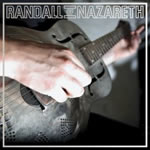|
|
 |
Dusted Reviews
Artist: Randall of Nazareth Album: Randall of Nazareth Label: Drag City Review date: Oct. 15, 2007 |

|
|
|
 |
It takes a certain amount of confidence to call yourself Randall of Nazareth, even if your name really is Randall (Randall Huth to be exact) and you do come from Nazareth – Pennsylvania, anyway. Yet while Randall Huth may not quite pull off the walking-on-water, loaves-and-fishes type miracles his stage name implies, he does something fairly remarkable. He breathes eerie, perfectly natural life into the picked blues styles he inhabits, tracing ghostly sketches of rural Americana without sounding in the least bit weighted down by tradition.
Huth is the guitar player from Pearls and Brass, a heavy, boogie blues rock trio most frequently compared to Blue Cheer and Cream. Here, in his first solo album, he unplugs and downshifts, trading the sludge and distortion of hard rock for delicate webs of acoustic picking, the howl of amplified arena anthems for spookily high pitched reveries. It's a move not unlike Zeppelin's transition from II to III, and yet far odder, more personal and less stage-y. There's an eccentricity to these cuts, especially rattling, percussive, Eastern-tinged "The Way", that bespeaks lots of time alone and wide remove from any commercial considerations.
Huth's solo album is by no means a traditional blues album; listen to it side-by-side with Delta players like Robert Johnson or Son House and you'll notice that it lacks the swaggering rhythm of old-time blues. Nor is it really straight folk, despite the pristine flurries of six-string and aching modal melancholy. Indeed, highlight cut "Ballad of a Sorry Lonely Breaking Man" borrows a little from both traditions, employing the familiar blues progressions, the transparently simple song structures of Appalachian music. And still, the song is its own thing, as weirdly tranquil as it is mournfully intense, taking flights into high yodeling fancy. It's the sort of song that sounds, on the surface, like it might have come drifting off any porch in the hollows – and yet so strange that it never did and never will.
The album takes a little while to get up to speed. The first two cuts – "Safety in the Sand" and "Climbing Trees" – are nothing remarkable. But the guitar figures that introduce "It's Nice to Know" are arresting, percussive low notes anchoring nervous, minor-key flurries. Huth's voice, modest, unassuming, a little wavery in the higher registers, flits and in and out of the web of guitar notes. There's an aching, undefined sadness to the whole thing, impressionistically delivered but there all the same. The song closes with Huth singing "We haven't seen the sun for seven months now / But it always sings us to sleep" over and over again, finally slowing to a stop. "Living Candles" comes right out of the Takoma school, full of rough-edged slides and vibrato-trills on the high strings. Vocals, unpolished and stream-of-consciousness, are something about being like a babysitter, an odd juxtaposition of the otherworldly and the mundane. "The Way" is the strangest, most compelling track on the disc, a droning haze of conflicting guitar threads, some metallic and percussive, others sustained like long piano notes over the dirge.
Most hard rock guitarists who unplug like this end up playing the same thing as before, only quieter. Huth's solo album, by contrast, is entirely different from Pearls and Brass. It's a spectral, inward-looking forage through old blues and folk forms that ends not in tribute but in weirdly personal, skewed and beautiful songs.
By Jennifer Kelly
|







